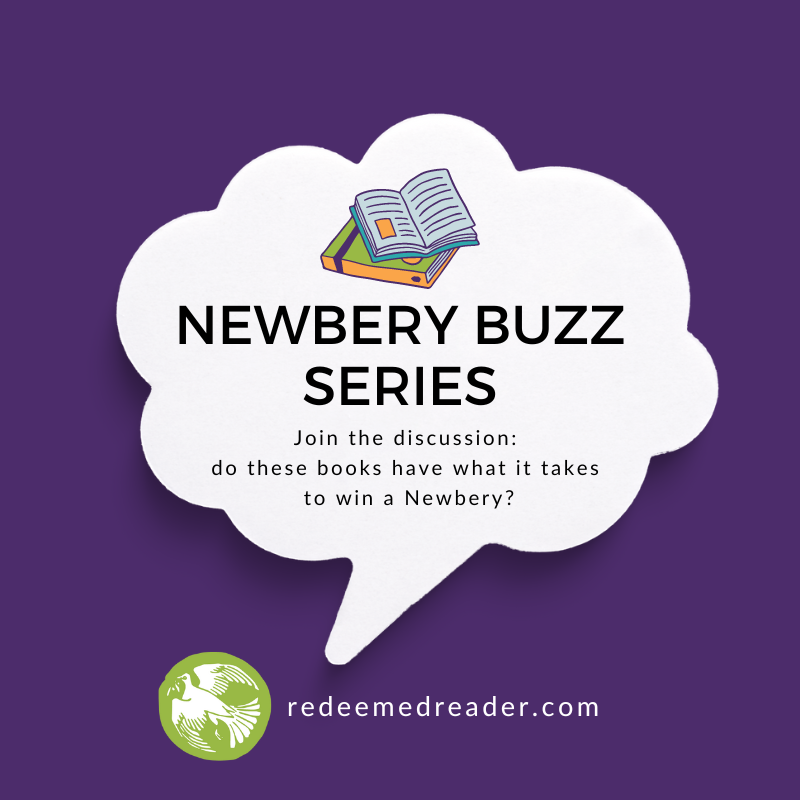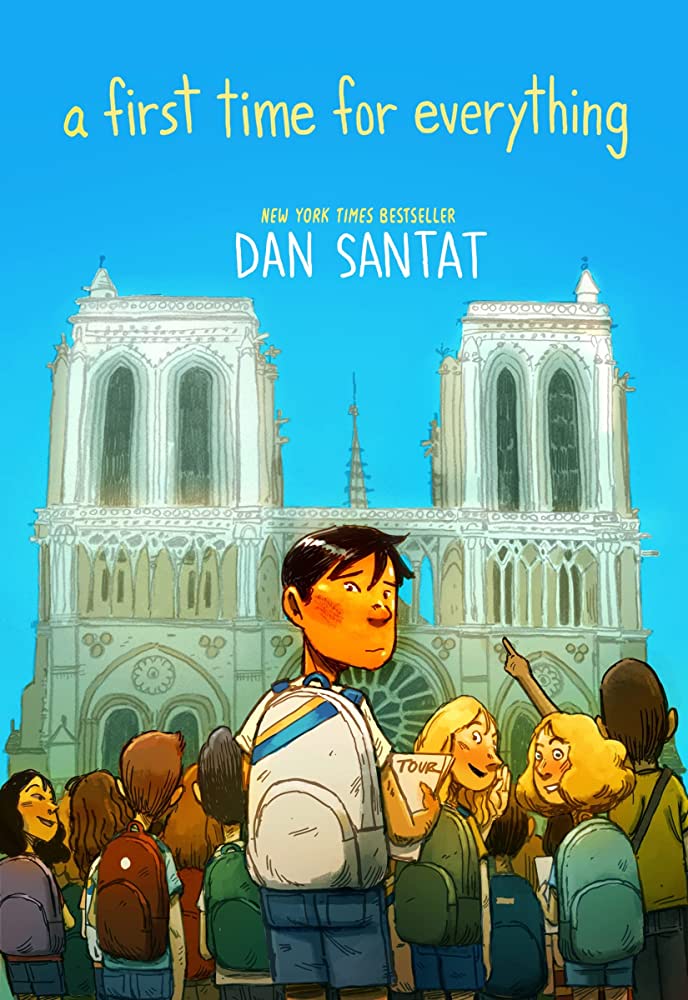A First Time For Everything has already won the National Book Award for Young People’s Literature. Could it also win the Newbery?
We’re kicking off our long-running Newbery Buzz Discussion series this year with a book that’s already won the National Book Award: A First Time for Everything by Dan Santat. To read the rest in our series or previous years’ discussions, check out the Newbery Buzz Page.

A First Time for Everything: Does it Have a Chance?
Betsy: Janie, let’s start off our Newbery Buzz discussions by looking at A First Time for Everything by Dan Santat. A First Time for Everything is Santat’s graphic novel memoir of a memorable summer he had in Europe between his turbulent and embarrassing middle school years and what is a more hopeful high school career. We’ve seen lots of buzz around this book, including its selection as the National Book Award for Young People’s Literature. A couple of years ago, New Kid by Jerry Craft won the Newbery. It’s also a graphic novel (and we liked it, too!), and I think it might have been the first time a graphic novel actually won the gold (It’s one of the few titles that we discussed as part of this series that actually got some Newbery love). Additionally, Santat won the Caldecott several years ago for his The Adventures of Beekle. Given the Newbery precedent for graphic novel love, the National Book Award commendation, and Santat’s own talent, A First Time for Everything seems to have a lot going for it.
Can you remind us a bit about the plot for those who haven’t read your earlier review?
Janie: Glad to. As you mentioned, this is a memoir. In the Afterword Santat stresses that he checked back with his friends on this trip—and it’s a testimony in itself that these friendships have lasted so long!—to make sure he got certain details right. Although, as in any memoir, some events will be left out and chronology may be adjusted for effect.
Santat begins with a picture of himself as a middle-schooler: an awkward time for anyone, but particularly as the son of Thai immigrants who don’t quite jibe with American culture. He’s horrified to learn that they’ve signed him up for a three-week study trip of selected European cities. His only goal is to get through school as quickly as possible, not participate in “learning experiences” that propel him out of his narrow comfort zone. His traveling companions include kids who have mocked him in the past and a girl he crushed on in a former phase, so that doesn’t help. But his perspective begins to change from the first day in Paris. For one, the students he meets from other schools offer him a chance for a clean slate with new acquaintances. For another, there’s the knockout view from the Eiffel Tower. Some of his experiences will raise parental eyebrows, such as his evening at a German beer garden, allowed by his chaperones as a literal taste of German culture (for the record, he discovers he hates beer). But the overall experience literally changed his life, and we might wonder if there would have been a “Caldecott winner Dan Santat” without it.
Betsy, you mentioned in conversation that you found this book sweet and touching. Care to expand?
Betsy: Janie, I did find this book sweet and touching. Would that all middle school boys tried to be as good a friend to others as Dan did, even though it so often backfired on him. For instance, there’s a flashback to a dance when he chose to dance with the “ugly girl,” not because he was dared to, but because she needed a friend. It backfired on him, his motives were misunderstood, and he ended up more confused than ever. But that’s part of what makes this book so touching. You kind of want to come alongside middle-school Dan, give him a big hug, and reassure him that most people mature a LOT after middle school; he just needs to hang in there.
I, too, had a life-changing European experience, although I was 19 and spent an entire semester in Europe (the Czech Republic). The drinking age there was 18 (in Dan’s experience, the drinking age in Germany was only 14!). As a sheltered 19-year-old from Christian high school and then Christian college, I hadn’t much worldly experience either, and many of the same things shocked me: the rampant smoking, the plethora of alcohol available (although Europeans didn’t seem to be abusing it quite the way I’d seen in America), and the general friendliness to travelers, especially in youth hostels. We traveled widely around Central Europe on the weekends, and it was exhilarating to have the freedom to make those sorts of decisions, to try new things, and to be freed from the social expectations we’d come from—not in an immoral sense, but in the sense that we slip into patterns of relating with those around us that aren’t always the best. It’s refreshing to get a taste of how to break free and be yourself without the normal reactions. I came away from my experience more confident, with lifelong friends, and with an appreciation for the many cultural trappings that are just that—cultural trappings. A bigger refrigerator isn’t a moral decision; it’s a reflection of the way Americans shop weekly for groceries compared to my Czech friends who went to the market daily. Ice in water: American. Fizz (carbonation in water): European. An so forth. It’s good to see how other people in other parts of the world live.
What Stands Out in A First Time for Everything
Janie, what do you think is most distinctive about this novel? After all, the Newbery committee loves that word. What might set this book apart from its competitors?
Janie: I would say its authenticity (that’s also a big word these days). I’m impressed that Santat is still in touch with friends from that trip—who still has friends they made at age 13?? And he was diligent enough to get in touch with them about details he wasn’t sure he remembered correctly. I also appreciated his honesty about his own awkwardness with girls (with everybody, really) and his severe disagreement with his parents about a European study tour. Turns out they were right! If rather clueless about his insecurity. Or maybe they weren’t, since parents usually know more than we think they do at that age. 🙂
I never got the chance to visit Europe as a student (my Texas junior high didn’t offer that option, and I didn’t know of any school that did!). But as a much older adult I’ve had the opportunity to spend 10-14 days in Japan, Greece, and Austria, and I can sympathize with the confusion and wonder of experiencing a different culture. We hear so much about overprotective parents these days; I’m glad Santat lived in an era that seemed more adventurous. I had some questions about Mrs. Bjork, his chaperone, especially when she let him sample the beer at the German beer garden. In her place, I think I would have let that adventure go by, but what do you think, Betsy?
Betsy: Ah, yes. The beer garden. I think I would have let that go by, too. After all, the drinking age in Germany at the time was 14, and he wasn’t even quite 14! VERY young. That being said, one of my professors allowed me to try some alcohol when I was in Europe at age 19—since the drinking age in the Czech Republic was 18. Thus, I was legally old enough. But Dan wasn’t legally old enough on top of being so young. Still, he hated the taste, and if that was her goal, mission accomplished. He had plenty of other chances to “live a little,” though, that were legal and less dangerous, so the beer tasting could have been skipped (and probably should have been).
Janie: It’s worth noting that Dan also experiences his first romance and first kiss (with a girl from another state who’s also on the tour). In the context, I found it sweet and innocent, and a big boost to his confidence (even though he goes through a bit of personal agony as well.) Still, as parents we’d be a bit squirmy over our own 13-year-olds cuddling in the back of the bus. What was your reaction, Betsy?
Betsy: If I read this book as a parent, then I cringe a bit over the romance. However, and this is a quick however, my 13-year-old self is reading this alongside my adult self, and that 13-year-old instantly remembers similar scenes on many youth camp trips and the like. And she chuckles in commiseration. I think your point about the book’s authenticity rings true here, Janie. Dan is giving us as accurate a picture of his experience, warts and all, as he can. A lot of how we might read (or view, since this is a graphic novel) scenes like Dan depicts will reflect the situations our children are currently in, the type of school group or youth group or peer group they are around. For many young teens, this will be nothing new. For others, this may be a bit startling.

Does A First Time for Everything Have What It Takes?
Janie, we began this conversation before A First Time For Everything was announced as the winner of the National Book Award for Young People. The NBA and Newbery committees are very different and very seldom pick the same book(s). Do you think A First Time For Everything will win both? Is it distinctive enough?
Janie: As you noted, Newbery and NB Awards hardly ever coincide. I think the last one might have been Holes, back in 1999. But I’d give First Time at least a 50-50 chance. The stigma against graphic novels came down a long time ago, with New Kid (also El Deafo, an honor award from a few years earlier) and this book has a similar tone of humor and pathos. It’s warm-hearted, just a little edgy, and true. I would not be at all surprised to see it win, and I’d be happy, too.
Betsy: I’d be happy, too, Janie! This is a fun book, a hopeful book, and a true one. It’s a great story and an empowering one—a word that is often thrown around these days under dubious circumstances. But in this case, Dan’s experience gives other middle schoolers hope that they will also overcome their awkwardness, that being their best selves is the perfect way to be (as opposed to constantly fitting into their peers’ mold), and that sometimes, just sometimes, parents know best!
Readers: do you agree with us? Have you read A First Time for Everything?
For the rest in this Newbery Buzz series, past and present, don’t miss our main Newbery Buzz series page!
Stay Up to Date!
Get the information you need to make wise choices about books for your children and teens.
Our weekly newsletter includes our latest reviews, related links from around the web, a featured book list, book trivia, and more. We never sell your information. You may unsubscribe at any time.
Support our writers and help keep Redeemed Reader ad-free by joining the Redeemed Reader Fellowship.
Stay Up to Date!
Get the information you need to make wise choices about books for your children and teens.
Our weekly newsletter includes our latest reviews, related links from around the web, a featured book list, book trivia, and more. We never sell your information. You may unsubscribe at any time.
We'd love to hear from you!
Our comments are now limited to our members (both Silver and Golden Key). Members, you just need to log in with your normal log-in credentials!
Not a member yet? You can join the Silver Key ($2.99/month) for a free 2-week trial. Cancel at any time. Find out more about membership here.



